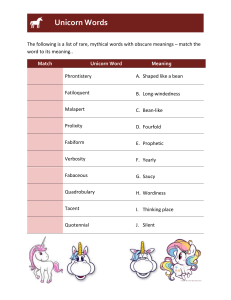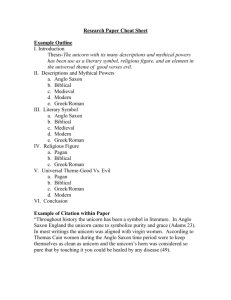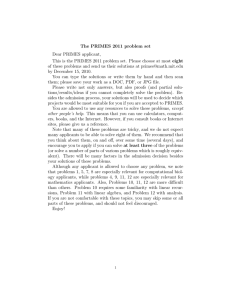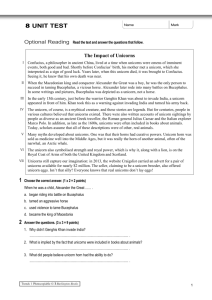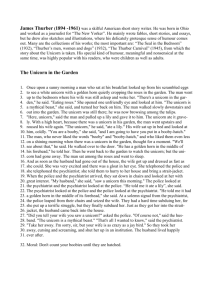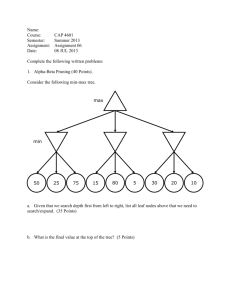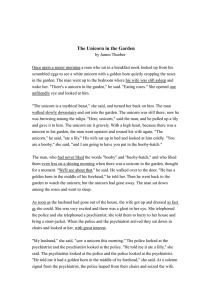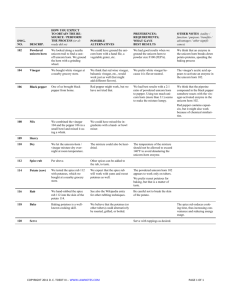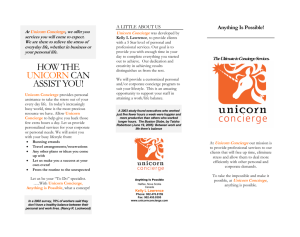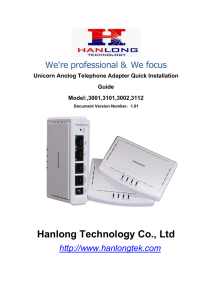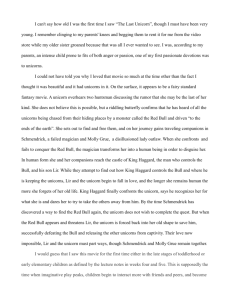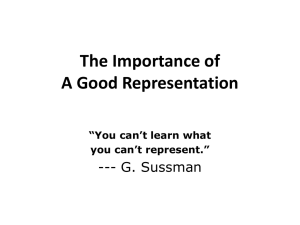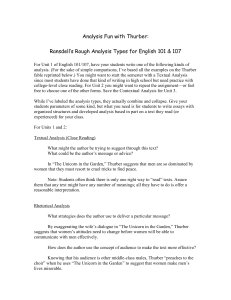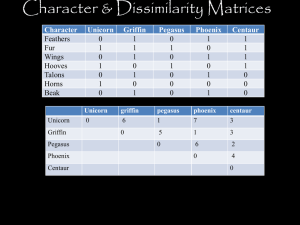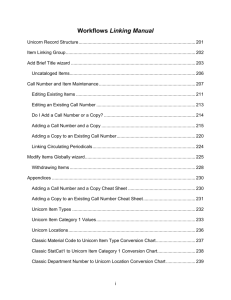Case: 3 Unicorn Hospital: Environmental Analysis
advertisement
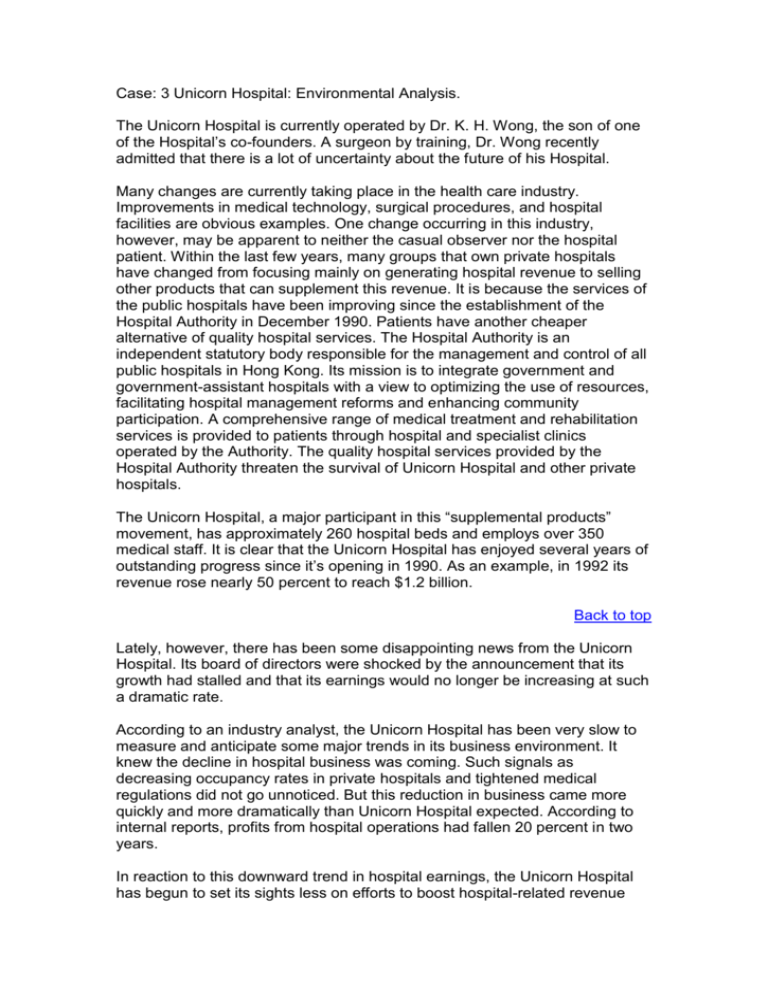
Case: 3 Unicorn Hospital: Environmental Analysis. The Unicorn Hospital is currently operated by Dr. K. H. Wong, the son of one of the Hospital’s co-founders. A surgeon by training, Dr. Wong recently admitted that there is a lot of uncertainty about the future of his Hospital. Many changes are currently taking place in the health care industry. Improvements in medical technology, surgical procedures, and hospital facilities are obvious examples. One change occurring in this industry, however, may be apparent to neither the casual observer nor the hospital patient. Within the last few years, many groups that own private hospitals have changed from focusing mainly on generating hospital revenue to selling other products that can supplement this revenue. It is because the services of the public hospitals have been improving since the establishment of the Hospital Authority in December 1990. Patients have another cheaper alternative of quality hospital services. The Hospital Authority is an independent statutory body responsible for the management and control of all public hospitals in Hong Kong. Its mission is to integrate government and government-assistant hospitals with a view to optimizing the use of resources, facilitating hospital management reforms and enhancing community participation. A comprehensive range of medical treatment and rehabilitation services is provided to patients through hospital and specialist clinics operated by the Authority. The quality hospital services provided by the Hospital Authority threaten the survival of Unicorn Hospital and other private hospitals. The Unicorn Hospital, a major participant in this “supplemental products” movement, has approximately 260 hospital beds and employs over 350 medical staff. It is clear that the Unicorn Hospital has enjoyed several years of outstanding progress since it’s opening in 1990. As an example, in 1992 its revenue rose nearly 50 percent to reach $1.2 billion. Back to top Lately, however, there has been some disappointing news from the Unicorn Hospital. Its board of directors were shocked by the announcement that its growth had stalled and that its earnings would no longer be increasing at such a dramatic rate. According to an industry analyst, the Unicorn Hospital has been very slow to measure and anticipate some major trends in its business environment. It knew the decline in hospital business was coming. Such signals as decreasing occupancy rates in private hospitals and tightened medical regulations did not go unnoticed. But this reduction in business came more quickly and more dramatically than Unicorn Hospital expected. According to internal reports, profits from hospital operations had fallen 20 percent in two years. In reaction to this downward trend in hospital earnings, the Unicorn Hospital has begun to set its sights less on efforts to boost hospital-related revenue and more on developing and marketing supplemental health insurance products. One such product is known as Health check programme. The Health check programme at the Unicorn Hospital provides a whole range of choices to accommodate individual needs. The purpose is to detect diseased at its early stage, offer advice on preventive measures to reduce risk factors and hospitalize when it deems necessary. The Health check programme is marketed to companies as a total health-care package for employees. Under the plan, customers pay a set fee that covers all health costs but, to enjoy the benefits of coverage, must see only doctors designated by the plan. Naturally, this is one means of funneling patients into the Unicorn Hospital’s empty hospital beds. According to Dr. Wong, the hospital must prove itself all over again. However, he believes that owning its own hospital will give the group a tremendous advantage in marketing and pricing the Health check programme. As he sees it, this ownership will allow the hospital to charge patients lower prices. Eventually, he plans to market the Health check programme to nearby communities because in Hong Kong, affluent diseases are prevalent. As incidences are increasing, regular annual health check-up becomes very important. Many observers describe this move into Health check as “too little too late.” After all, one of the Unicorn Hospital’s major competitors, St. Louise Hospital, made this move some time ago and now has a solid base in the health care area. Only time will tell whether the Unicorn Hospital’s tardy attempt to follow suit will be successful. Question for consideration: Would you suggest Dr. Wong some guidelines to perform the environmental analysis on the Unicorn Hospital? Back to top Instructor’s manual: Topic covered: The problems of setting up a business organization: internal factors and external factors. Suggested solution: 1. There is no one best or standard way to perform an environmental analysis and determine present and future threats to the organizations attainment of its goals. By following the guidelines, however, trainees/managers can enhance the quality of their environmental analysis regardless of the specific procedure they use. 2. Environmental analysis is defined as the process of monitoring the organizational environment to identify both present and future threats and opportunities that may influence the firm’s ability to reach its goals. The purpose of environmental analysis is to explore future conditions of the organizational environment and to incorporate what it learns into organizational decision-making. 3. Guidelines for performing an environmental analysis: 1. Determining the relevance of environmental levels to organizations is to consider the organization’s size and its degree of involvement in business. As an organization increase in size and becomes more involved in business, variables in the general environment become more relevant to successful management of the organization. 2. Determining the relevance of strategic issue, which is an environmental factor, either inside or outside the organization that is likely to have an impact on the ability of the enterprise to meet its objectives. 4. Environmental scanning is defined as the process of gathering information about events and their relationships within an organization’s internal and external environments for the purpose of helping management to determine the future direction of the organization. 5. Factors affecting the external environment: 1. Economic environment 2. Technological environment 3. Legal-Political environment 4. Social environment These factors can be observed through: 1. Personal experience 2. Journals 3. Reports 4. Books 5. Professional meeting 6. Industrial conferences 7. Colleagues 8. Board members 9. Friends 10. Employees 11. Other sources 6. Factors affecting the internal environment: 1. Physical assets 2. Human resources 3. Interpersonal relations 4. Inertia of past decisions and views 5. Personal values These factors can be observed through: 1. Personal experience 2. Reports 3. Conferences 4. Committees 5. Memoranda 6. Subordinate 7. Employees 8. Outsiders 9. Other sources
